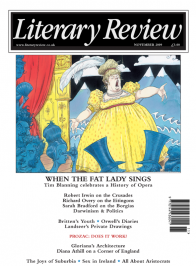Toby Lichtig
The Boy Who Was a Wolf & a King
The Wild Things
By Dave Eggers
Hamish Hamilton 281pp £14.99
Maurice Sendak’s 1963 children’s classic Where the Wild Things Are is a story about anger. Boisterous Max is sent to his room without any supper; he reacts by turning the world around him into a gothic forest of perilous beasts. When Max is made master of his fury, he sinks into contrition (homesickness) and returns to the fold of his parents’ forgiveness.
The lasting attraction of Sendak’s book is a testament to the powerful simplicity of the fable (the writing itself amounts to a mere ten sentences) and his wonderfully evocative illustrations (the monsters are apparently caricatures of relatives he was forced to endure as a child). The story has already been adapted for animation and opera, and the film, written by Spike Jonze and Dave Eggers, was released this month. While collaborating on the latter, Eggers was asked by Sendak if a novel might be produced out of the accumulated material. The result is The Wild Things (‘There’s one in all of us’).
Seven-year-old Max (‘part wolf and part wind’) is trapped in a world of erratic adults. His parents are divorced and his mother’s idiotic new boyfriend is always around. The neighbours are terrified of everything (‘Molesters! Drugs! Homeless! Needles!’) and his teenage sister no longer wants to play. No

Sign Up to our newsletter
Receive free articles, highlights from the archive, news, details of prizes, and much more.@Lit_Review
Follow Literary Review on Twitter
Twitter Feed
Under its longest-serving editor, Graydon Carter, Vanity Fair was that rare thing – a New York society magazine that published serious journalism.
@PeterPeteryork looks at what Carter got right.
Peter York - Deluxe Editions
Peter York: Deluxe Editions - When the Going Was Good: An Editor’s Adventures During the Last Golden Age of Magazines by Graydon Carter
literaryreview.co.uk
Henry James returned to America in 1904 with three objectives: to see his brother William, to deliver a series of lectures on Balzac, and to gather material for a pair of books about modern America.
Peter Rose follows James out west.
Peter Rose - The Restless Analyst
Peter Rose: The Restless Analyst - Henry James Comes Home: Rediscovering America in the Gilded Age by Peter Brooks...
literaryreview.co.uk
Vladimir Putin served his apprenticeship in the KGB toward the end of the Cold War, a period during which Western societies were infiltrated by so-called 'illegals'.
Piers Brendon examines how the culture of Soviet spycraft shaped his thinking.
Piers Brendon - Tinker, Tailor, Sleeper, Troll
Piers Brendon: Tinker, Tailor, Sleeper, Troll - The Illegals: Russia’s Most Audacious Spies and the Plot to Infiltrate the West by Shaun Walker
literaryreview.co.uk